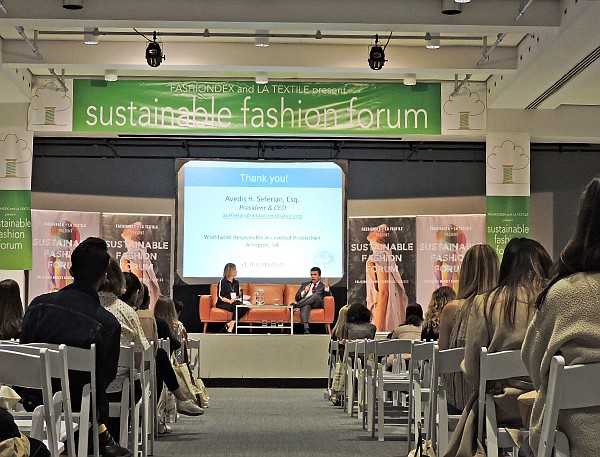From left, Nancy Miller, chair of fashion merchandising at LIM College, and Avedis Seferian, president and CEO of Wrap, discuss standards and certifications
TRADE SHOWS
Fashiondex’s Sustainable Fashion Forum Addresses Solutions in Apparel Production
This October’s LA Textile show, held Oct. 2–4 at the California Market Center, featured the third Los Angeles edition of the Sustainable Fashion Forum by Fashiondex. Hosted on Oct. 3 in the Fashion Theater of the CMC, the event focused on production solutions. As consumers continue to lead more-ethical and eco-friendlier lifestyles, the sustainable movement has reached mainstream status in the apparel industry. Attendees were able to meet with companies that offer sustainable products and services while listening to industry experts on sustainability provide guidance through their visions for the future.
Offering a transparent approach to event production, the team at Fashiondex sought to build upon the progress made during previous installments of the forum. Founder Andrea Kennedy revealed that show operations supported an ecologically sound mission through using recycled badges, creating badge lanyards using donated downcycled fabric strips from the Jessica Simpson brand, reusing signs and banners, providing 100 percent certified-organic-cotton bags, locally sourcing show programs, and providing compostable cups and utensils during meals.
“We are committed to reducing waste at this forum, and when we cannot reduce it we are committed to offsetting it and trying to get to carbon neutral for this and all the events that Fashiondex is a part of,” said Kennedy, who is also a faculty member at New York City's LIM College, where she teaches classes covering fashion and sustainability. “We’re committed to sharing that information with you so you can do the same.”
This movement to reduce the event’s carbon footprint included a new initiative through which Fashiondex offset carbon emissions for speakers and attendees by partnering with the Shelburne, Vt.–based nonprofit organization One Tree Planted to plant a tree for each person who was in attendance. With 378 trees needed to offset the carbon emissions created by speakers’ transportation and more than 287 necessary to combat the impact of attendees, Fashiondex committed to planting a total of nearly 700 trees.
Working well together
A large problem within the fashion industry has been a lack of willingness on the part of professionals to collaborate. Fearful of becoming vulnerable by working with competitors, brands were once resistant to sharing better methods of production, but this antiquated point of view is changing.
Prior to introducing Outerknown’s director of design, Bethany Mallet, Nicholas Brown of Fashion Revolution USA revealed a key element driving the industry toward greater sustainability.
“We often call ourselves pro-fashion protesters. We love fashion and we want to see it become a force for good,” he said. “Collaboration across the entire value chain from the farmer to the citizen is the only way to transform this industry.”
For attendee Ladi Saka of downtown Los Angeles–based Tekton, a company that provides apparel printing and embroidery, the message of sustainable manufacturing is personal. His business partner, Christian Martinez, is the son of a screenprinting worker whose job exposed him to materials that caused him to return home each day smelling of potentially toxic chemicals. The event provided opportunities for Saka to meet with like-minded professionals who value collaboration.
“We need each other. People don’t like to always share their secrets, but at least here you can get information to further your business and help each other,” he said. “A lot of these speakers are encouraging each other to excel. This event is not about being flashy. People are actually talking about sustainability.”
The ecological and ethical costs
During her presentation, which revealed the sustainable initiatives at the Culver City, Calif.–based Outerknown, Mallet took questions from members of the audience, one of whom asked about the greatest challenges faced by the brand. One of the largest sourcing-related hurdles for Mallet is finding materials created with natural and sustainable fibers. Of particular concern was the high minimums that are, at times, associated with these fabrics.
“Sometimes we fall in love with a fabric, but the minimums to get it converted to organic cotton are 7,000 yards, and we’re not there yet,” she said. “Sometimes we fall in love with beautiful recycled wool, but, for the price point, we want to deliver value and not be unapproachable as a brand. Sometimes we do the math and it is unworkable.”
On the bright side, Mallet reported that her company is working with suppliers to find a middle ground to remain at the forefront of sustainable-apparel production.
The constant conflict between producing clothing sustainably, through environmentally sound practices and ethical manufacturing, is a great challenge to the apparel industry. A large piece of the sustainable-apparel manufacturing puzzle requires manufacturers to examine ways in which they can produce clothing while creating a work environment in which employees are valued.
As a member of the Domestic Production Panel, led by Study NY and Re:Source’s Tara St James, Lusine Mkrtchyan revealed the realities of producing apparel locally. The Los Angeles founder of the full-service apparel-consulting firm PremierSource made a connection between the closure of manufacturing businesses in the city to job loss and poverty.
“It’s sad to see people lose their jobs. Brands keep pushing prices down, and minimum wage is going up. It’s a struggle out there and hard to see,” she said. “The trend is in niche manufacturing and people caring more about where they are making their clothes.”
Working in Los Angeles, Mkrtchyan has witnessed the economic devastation caused when brands fail to establish relationships and conduct business with local production partners. She encouraged designers to create goods in Los Angeles and use natural, organic materials.
“I am in the factories all day, every day, and I am seeing what is going on in the streets of Los Angeles. I would love to see jobs come back to L.A.,” she said. “When you talk to someone at a factory, ask them, ‘Are you looking for quality or quantity?’”






















